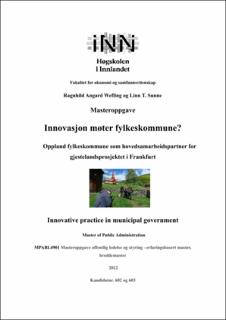Innovasjon møter fylkeskommune? Oppland fylkeskommune som hovedsamarbeidspartner for gjestelandsprosjektet i Frankfurt
Master thesis
Permanent lenke
https://hdl.handle.net/11250/3064685Utgivelsesdato
2022Metadata
Vis full innførselSamlinger
Sammendrag
I denne oppgaven diskuterer vi aspekter ved de to begrepene samskaping og innovasjon og knytter dem til et case. Vi ser særlig på medvirkning, forholdet mellom aktører og offentlig verdi. Vi gjør kort rede for ulike typer innovasjoner og tar særlig for oss policy innovasjon. Vi har formulert problemstillingen slik: Var Oppland fylkeskommunes prosjekt Frankfurt 2019 en samskapt innovasjon? Hva skjedde i møtet mellom innovasjonsidéen og institusjonen? I 2019 var Norge gjesteland på bokmessa i Frankfurt, en stor satsing som kostet rundt 52 millioner. Oppland fylkeskommune valgte å gå inn som en av tre hovedsamarbeidspartnere i gjestelandsprosjektet.
Denne oppgavens case er Oppland fylkeskommunes egen prosjektorganisering, her kalt Frankfurt 2019. Vi har brukt kvalitative metoder i vår undersøkelse, nærmere bestemt semistrukturerte intervjuer og e-postintervjuer. Vi har også analysert dokumenter, både referater, saksutredninger og politiske vedtak. Vi har funnet at Frankfurt 2019 var et samstyrt prosjekt. Selv om det var gjensidig avhengighet mellom aktørene, var det ikke et likeverdig samarbeid mellom dem. Dette forholdet, måten beslutninger ble tatt på og den målrettede prosessen tilsier at det heller er snakk om samstyring enn samskaping. Å være hovedsamarbeidspartner i en stor nasjonal litteratursatsning på en internasjonal bokmesse var en ny kontekst for Oppland fylkeskommune. Det oppsto likevel ikke nye arbeidsformer, og våre informanter oppgir at fylkeskommunen var godt rigget for å samstyre fleraktørprosjekter. Den tydeligste formen for innovasjon vi har funnet i prosjektet, er policy innovasjon. Det har oppstått et nytt syn på litteratur i en samfunnsutviklerrolle og politikerne har vært i en utviklerrolle. Frankfurt 2019 ga offentlig verdi på flere områder. Det gjaldt særlig samhold og stolthet i organisasjonen. Det at Oppland fylkeskommune var historie få måneder etter gjennomføring av prosjektet er et av prosjektets paradokser. Begrepet “litteraturfylke” er videreført i Innlandet fylkeskommunes kulturstrategi.
Ideen om Frankfurt 2019 ble oversatt til organisasjonen av fylkesordføreren. Vedtak og gjennomføring gikk forholdsvis raskt, og organisasjonen ble ikke særlig påvirket av ideen. Derimot var det stor grad av ideutvikling som foregikk innen de institusjonelle rammene. Frankfurt 2019 førte ikke til nye arbeidsformer eller radikalt endrede roller for noen av aktørene, men prosjektet var et betydelig bidrag til at kunst og kultur ble kontekstualisert på en ny måte i Oppland fylkeskommune. Vi vil anbefale ytterligere forskning på hvordan litteratur kan spille en rolle som samfunnsutvikler. In this thesis, we will discuss aspects of the two concepts of co-creation and innovation linking them to a case study. We will look in particular at participation, and the relationship between actors and public value. We will give a brief account of various types of innovation and particularly focus on policy innovation. We have formulated the problem as follows: Was Oppland County Council's project Frankfurt 2019 a co-created innovation? What happened at the intersection between the innovation idea and the institution? In 2019, Norway was a guest country at the book fair in Frankfurt, a major investment that cost around 52 million Norwegian kroner. Oppland county council chose to enter as one of three main collaboration partners in the guest country project.
The case study for this thesis is Oppland county council's own project organisation, here called Frankfurt 2019. We have used qualitative methods in our investigation, specifically semi-structured interviews and email interviews. We have also analyzed documents, minutes, case investigations and political decisions. We have found that Frankfurt 2019 was a co-managed project. Although there was mutual dependence between the actors, there was not equal cooperation between them. This relationship, the way in which decisions were made and the targeted process indicate that it is rather a question of co-management than co-creation. Being the main collaboration partner in a major national literary initiative at an international book fair was a new context for Oppland county council. Nevertheless, new forms of work did not arise, and our informants state that the county council was well equipped to co-manage multi-actor projects. The clearest form of innovation we have found in the project is policy innovation. A new view of literature has arisen in a social development role and the politicians have been in a developer role. Frankfurt 2019 provided public value in several areas. This particularly concerned cohesion and pride in the organization. The fact that Oppland county council was merged with another county a few months after the completion of the project is one of the project's paradoxes. The term "literature county" is continued in the newly formed Innlandet County Council's cultural strategy.
The idea behind Frankfurt 2019 was translated into the organization by the county mayor. Decisions and implementation went relatively quickly, and the organization was not particularly affected by the idea. In contrast, there was a large degree of idea development that took place within the institutional framework. Frankfurt 2019 did not lead to new forms of work or radically change roles for any of the actors, but the project was a significant contribution to art and culture being contextualized in a new way in Oppland county council. We would recommend further research into how literature can play a role as a social developer.
